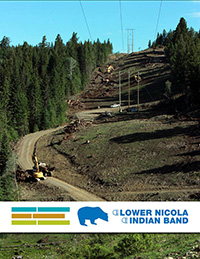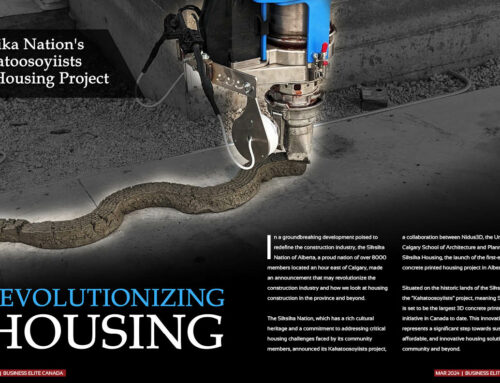Preserving indigenous values through entrepreneurship
By Rajitha Sivakumaran
The territory surrounding the Thompson and Nicola rivers in the southern interior of British Columbia has a profound history and in much of this story, the Scw’exmx, the people of the creeks, play a large role. Throughout the ages, this land, home of the Nlaka’pamux Nation, has played host to skilled hunters and fishers, distinct cultures, colonization, reserves, the 1858 gold rush and a smallpox epidemic.
Long before Contact Period, the early Scw’exmx settlers were engaged in a number of economic activities like fishing, trapping and gathering. In the modern era, however, the descendants of the Scw’exmx have adopted an entrepreneurial approach to economic development and the Lower Nicola Indian Band (LNIB) is a significant player on this stage.
As one of the largest bands in the area, the LNIB represents the concerns of 1,200 community members, who live both on reserves and in urban settings like Merritt, Kamloops and Vancouver. Presently under the leadership of Chief Aaron Sam, the band is involved in everything from human services and infrastructure to economic development and financial administration. Within these categories, the LNIB is deeply immersed in all the things a governing body is charged with carrying out: bylaw and policy development, career advancement, health services, entrepreneurship, land and natural resource management, and public works.
Moving forward through entrepreneurship
The modern era has brought with it substandard living conditions on reserves, poverty and frightening statistics for the descendants of the Nlaka’pamux Nation. About 66 per cent of individuals make less than $15,000 annually and 27 per cent are unemployed. In regards to education, 33 percent of people did not obtain a high school diploma and only 28 per cent had completed higher education.
However, these numbers serve only to empower Chief Sam’s mission of complete revitalization. Both chief and council are plowing through the complexities of governance with a ‘proud to be LNIB’ attitude. During the past two and a half years under Chief Sam’s administration, the area has met real change. Aaron Sam is a chief with values focused on economic development, revenue and entrepreneurial partnerships.
“The world is our oyster. We actively seek out any kind of economic development activity that will benefit the land, benefit the band and its members, all the while respecting our traditional values, which includes protecting land, air and water,” said Ruth Tolerton, the band’s communications coordinator.
As a result, the band contributes a stunning $30 million to the region’s GDP annually. Last year, the LNIB received recognition at the BC Aboriginal Business Awards as the Joint Venture Business of the Year for outstanding achievement.
“This business award — it’s something that we’re proud of. It’s also something of a first step in creating more opportunities for our community and creating more revenue and wealth, so that we can improve the quality of life for our community members,” Chief Sam said.
Financing the future through good governance
“The fundamental part in terms of moving forward is that you have to have your finances in order and we’re very proud of our current financial status. We’ve been very diligent and we’re happy where we are financially,” Chief Sam said.
Although some funding is available through Indigenous and Northern Affairs, self-sufficiency is the mandate of the LNIB — a goal that is accomplished by actively seeking economic development opportunities. This subsequently creates employment for community members and generates revenue, which is then used to finance initiatives that elevate the standard of living and improve the lives of LNIB members living both on and off the reserve. Presently, the LNIB is involved in infrastructure projects worth millions of dollars, like the expansion of the LNIB School ($1.8 million) and the construction of the Rocky Pines Community Centre ($3 million).
“Our development corporation is key and we’re very happy with our board of directors. I believe that when you have a really good board, you’re going to be able to make informed decisions when it comes to creating potential business opportunities,” Chief Sam said.
The most difficult part of being chief is ensuring good governance. “The key steps in moving forward is to have good policies in place, appropriate bylaws… I felt that we’ve really taken some steps forward in terms of creating a stable government and separating the politics from the business,” Chief Sam said.
Aboriginal rights and issues of land claims are another challenge of the job. Presently, the LNIB is in the process of implementing the Land Code, which gives the band self-government over land issues.
“What you’re doing is transferring the authority that the Department of Indigenous Affairs has to the First Nations themselves so that we can make the decisions because we’re the ones who live here and we’re the ones who understand our culture and our customs as it relates to land issues,” Chief Sam said.
The voice of the people
Aside from the entrepreneurial aspect of his job description, Chief Sam serves as the representative of the people who elected him to the position of chief. A lot of it involves communicating with community members and listening to their thoughts and concerns. The chief also serves as the voice of the people in dialogues with government and corporate officials, where interest in the utilization of the LNIB’s traditional land is concerned.
One example of this is the negotiations that are currently underway between the LNIB and Highland Valley Copper, a mining company owned by Teck Resources. “We’ve had a fairly successful relationship with the HVC Teck. We have done studies for them on culture, the land, animals and plant life, and the effect of mining on traditional land use. HVC Teck has been a willing positive partner in that regard,” Tolerton said.
The LNIB has also engaged in talks with the federal government about the National Indigenous Clean Technology Hub. The focus of the project is education and equipping Native entrepreneurs with the knowledge and guidance needed to convert to clean technology and green energy.
Active community engagement is seen even on the business side of things. Communication runs in a two-way direction; the council’s plans and future projections reach the people and open lines of communication ensure that feedback from the community reaches the council.
“Something we take very seriously is consulting the community,” Chief Sam said.
With a population that is expected to double every 20 years, the band is heavily involved in revitalizing the Nlaka’pamux culture for the future generations. Although Canada is often described as a mosaic of cultures, assimilation has diluted the prevalence of First Nations culture. For instance, in the Nicola Valley, only 16.8 per cent know how to speak the traditional language and of this, a small 1.6 per cent speak it at home. The LNIB is actively trying to increase these numbers. It is in the midst of implementing the Language Nest, a program whereby Native children are exclusively taught the mother tongue from birth to age five in a home setting. This system will employ elders and teachers and serve as a language revitalization tool for both parents and children.
At the end of the day, the motivation behind the band’s entrepreneurial endeavours is to solidify a sense of identity and pride in the LNIB community.
www.lnib.net







